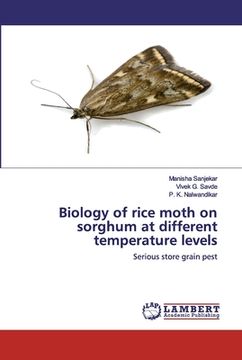Share
Biology of rice moth on sorghum at different temperature levels
Manisha Sanjekar
(Author)
·
Vivek G. Savde
(Author)
·
P. K. Nalwandikar
(Author)
·
LAP Lambert Academic Publishing
· Paperback
Biology of rice moth on sorghum at different temperature levels - Sanjekar, Manisha ; Savde, Vivek G. ; Nalwandikar, P. K.
Choose the list to add your product or create one New List
✓ Product added successfully to the Wishlist.
Go to My Wishlists
Origin: U.S.A.
(Import costs included in the price)
It will be shipped from our warehouse between
Wednesday, August 07 and
Wednesday, August 14.
You will receive it anywhere in United Kingdom between 1 and 3 business days after shipment.
Synopsis "Biology of rice moth on sorghum at different temperature levels"
The rice moth (Corcyra cephalonica Stainton) is one of the common pests of several storage products and cereal commodities in India. Its larval stages cause serious damage to rice, gram, sorghum, maize, groundnut, cotton seeds, peanuts, linseeds, wheat, coffee, cocoa beans and milled products and survive in a wide range of temperature and humidity between 15 oC and 35 oC and between 15 to 90% relative humidity and high damage has been reported even under extreme condition. C. cephalonica is being utilized as main laboratory host for mass rearing or production of beneficial egg parasitoids viz., Trichogramma minutum Riley, and the egg-larval parasitoid like Chelonus blackburnii Cameron, pupal parasitoid like viz., Tetrastichus aggari Rohwar have used its eggs for rearing in laboratory. There is little information available on the development of C. cephalonica under different sets of controlled temperatures and humidity on stored broken grains of sorghum mass multiplication of natural enemies depends on effective rearing of laboratory host like C. cephalonica under different environmental conditions. Thus the present study was done at 20 oC, 25 oC, 30 oC and 35oC temperature levels.

